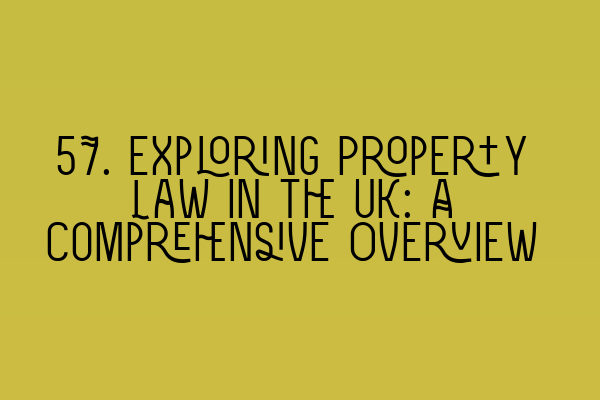Exploring Property Law in the UK: A Comprehensive Overview
Property law plays a vital role in governing our rights and obligations regarding land and real estate in the UK. Whether you’re a property owner, buyer, seller, or tenant, having a solid understanding of property law is essential. In this comprehensive guide, we will explore the key aspects of property law in the UK, providing you with a foundational knowledge to navigate the complexities of property transactions.
1. Introduction to Property Law
Property law encompasses a wide range of legal principles and regulations that govern the ownership, transfer, and use of land and real estate. It includes both residential and commercial properties, as well as rights and obligations related to leases, mortgages, and property development.
To ensure a smooth and legally sound property transaction, it is crucial to familiarize yourself with the various legal concepts and procedures involved. Let’s delve into some of the key areas of property law in the UK.
2. Land Ownership and Registration
In the UK, land ownership is governed by a system of registration. The Land Registry is responsible for maintaining a record of land ownership and interests. It is essential to understand the different types of land ownership, such as freehold and leasehold, and the legal implications associated with each.
When engaging in a property transaction, it is vital to conduct a thorough search of the Land Registry to ensure that the seller has a valid title and that there are no encumbrances or restrictions on the property.
For further information on land ownership and registration, you can visit the SQE 1 Practice Exam Questions article on the FQPS website.
3. Property Transactions
Whether you are buying or selling a property, there are various legal considerations that must be addressed. Property transactions involve complex contracts, negotiations, and financial arrangements.
When buying a property, it is essential to engage the services of a solicitor to guide you through the process. They will handle the legal aspects, such as contract drafting, property searches, and ensuring compliance with legal requirements.
Similarly, when selling a property, a solicitor will help ensure that all necessary legal documents are prepared correctly and that the transaction proceeds smoothly.
If you want to enhance your knowledge of property transactions, you can check out the SQE 1 Practice Mocks FLK1 FLK2 article on the FQPS website.
4. Leases and Tenancy Agreements
Leases and tenancy agreements govern the relationship between landlords and tenants. Understanding the rights and obligations of both parties is crucial to avoid disputes and ensure a harmonious tenancy.
When entering into a tenancy agreement, it is vital to have a clear understanding of the terms and conditions, including rent payments, repairs, and termination clauses. Landlords must comply with their legal obligations, such as providing a safe and habitable living environment, while tenants must fulfil their responsibilities, including paying rent on time and maintaining the property.
To gain further insights into leases and tenancy agreements, you can explore the SQE 2 Preparation Courses article on the FQPS website.
5. Mortgages and Financing
For many property buyers, securing a mortgage is necessary to finance their purchase. Understanding the intricacies of mortgage contracts and the legal requirements surrounding lending is essential.
A mortgage is a loan secured against a property. The lender has a legal interest in the property until the loan is repaid in full. If the borrower fails to meet the repayment obligations, the lender may exercise their rights, which can lead to repossession and foreclosure.
When entering into a mortgage agreement, it is vital to seek professional advice from a solicitor or a mortgage broker to ensure that you fully understand the terms and conditions and the consequences of defaulting on payments.
To explore more about mortgages and financing in property transactions, you can refer to the SQE 1 Preparation Courses article on the FQPS website.
6. Property Development and Planning
Property development entails the construction, renovation, or conversion of existing buildings or land into new properties. This area of property law involves complex regulations, including planning permissions, building regulations, and environmental considerations.
Obtaining planning permission is a vital step in property development. Local authorities have the power to grant or deny permission based on various factors, such as the impact on the local community, infrastructure, and environmental sustainability.
If you’re interested in property development and planning, it is recommended to stay updated with the SRA SQE Exam Dates article on the FQPS website. This will provide you with information about the examination dates for the Solicitors Qualifying Examination (SQE), which covers property law and various other subjects.
Conclusion
Property law is a complex field, requiring a comprehensive understanding of the legal principles and regulations that govern land and real estate transactions in the UK. Whether you’re buying, selling, leasing, or developing property, having solid knowledge of property law is essential to protect your rights and interests.
We hope this comprehensive overview has provided you with valuable insights into property law in the UK. For further information and resources, please visit the FQPS website where you can explore SQE 1 and 2 preparation courses, practice exam questions, and mock exams to enhance your understanding and preparation.
